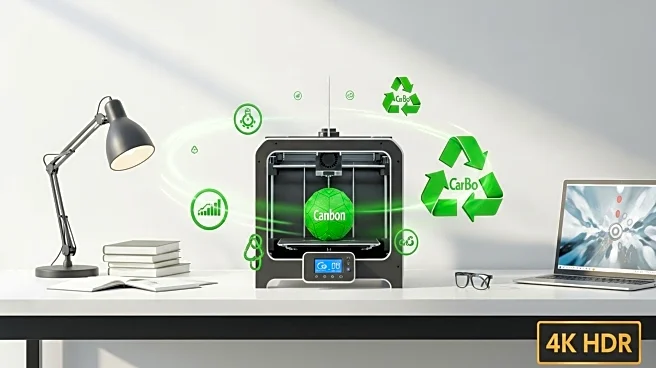What's Happening?
Stratasys Ltd. has published its fourth annual Environmental, Social, and Governance (ESG) and Sustainability Report, marking significant advancements in its sustainability initiatives. The report, released on September 17, 2025, highlights a 23.1% reduction in the company's overall carbon footprint from 2023 to 2024. A notable feature of this year's report is the first-ever disclosure of Scope 3 greenhouse gas emissions, which includes emissions from purchased goods and services, upstream transportation, business travel, product use, and end-of-life treatment. This comprehensive analysis, verified by independent third parties, underscores Stratasys' commitment to transparency and accountability in its environmental impact. The report also details other sustainability achievements, such as a 15% reduction in water consumption intensity, 38.4% of waste diverted from landfills, and the recycling or reconditioning of 477 metric tons of materials. Stratasys has also launched initiatives like SAF™ ReLife for full reuse of PA12 waste powder and the GrabCAD Carbon Estimator for real-time carbon tracking in additive manufacturing workflows.
Why It's Important?
The release of Stratasys' ESG report is significant as it demonstrates the company's leadership in sustainable manufacturing practices, particularly in the additive manufacturing sector. By reducing its carbon footprint and disclosing Scope 3 emissions, Stratasys sets a precedent for transparency and environmental responsibility, which could influence other companies in the industry to adopt similar practices. The report's findings highlight the potential for sustainable practices to reduce costs, minimize waste, and enhance supply chain resilience. This aligns with the growing demand from consumers and stakeholders for environmentally conscious business operations. Stratasys' efforts contribute to broader industry trends towards sustainability and could drive innovation in low-carbon production technologies, benefiting both the environment and the economy.
What's Next?
Stratasys is expected to continue its focus on sustainability by expanding its environmental management certifications and further integrating sustainable practices across its operations. The company may also seek to enhance its product offerings with more eco-friendly solutions, potentially influencing industry standards and customer expectations. As Stratasys continues to innovate in additive manufacturing, it may face increased scrutiny from stakeholders and regulatory bodies, necessitating ongoing transparency and accountability in its ESG reporting. The company's initiatives could inspire similar actions from competitors, leading to a more sustainable manufacturing landscape.










